Report on Entrepreneurial Strengths, Weaknesses, and Societal Role
VerifiedAdded on 2023/01/23
|8
|3659
|78
Report
AI Summary
This report delves into the multifaceted world of entrepreneurship, exploring the strengths and weaknesses inherent in entrepreneurial endeavors. It highlights the significant contributions of entrepreneurs to society, emphasizing their role in driving economic growth, stimulating employment opportunities, and fostering innovation. The report examines case studies of prominent entrepreneurs such as Mark Zuckerberg and Jack Ma, analyzing their successes, challenges, and ethical considerations. It discusses the application of SWOT analysis in assessing entrepreneurial ideas and the importance of adapting to market demands. Furthermore, the report addresses the challenges entrepreneurs face, including financial management, team building, and marketing strategies, while also considering the ethical dilemmas that can arise. The analysis emphasizes the importance of perseverance, ethical conduct, and the ability to learn from failures in achieving entrepreneurial success.
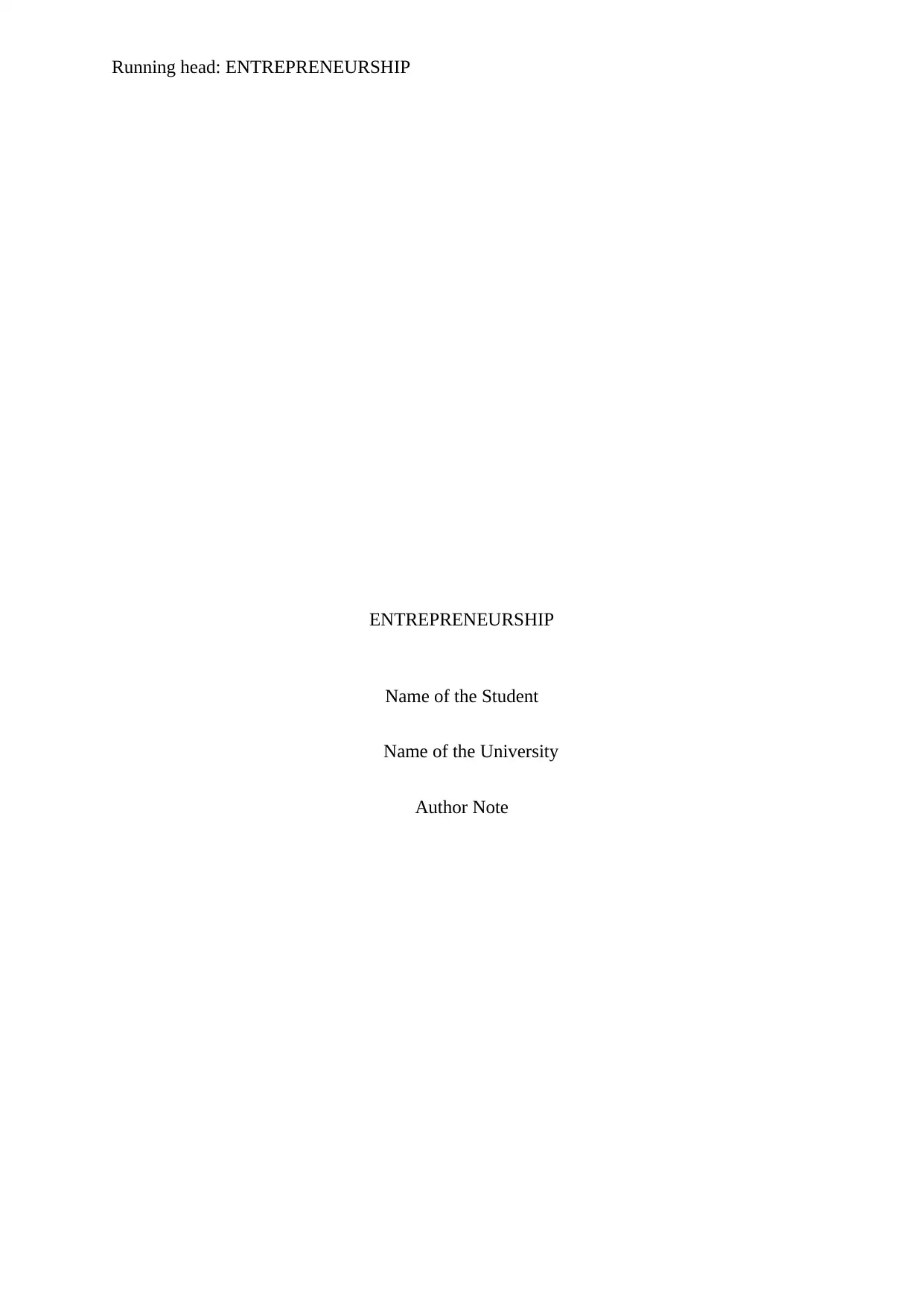
Running head: ENTREPRENEURSHIP
ENTREPRENEURSHIP
Name of the Student
Name of the University
Author Note
ENTREPRENEURSHIP
Name of the Student
Name of the University
Author Note
Paraphrase This Document
Need a fresh take? Get an instant paraphrase of this document with our AI Paraphraser
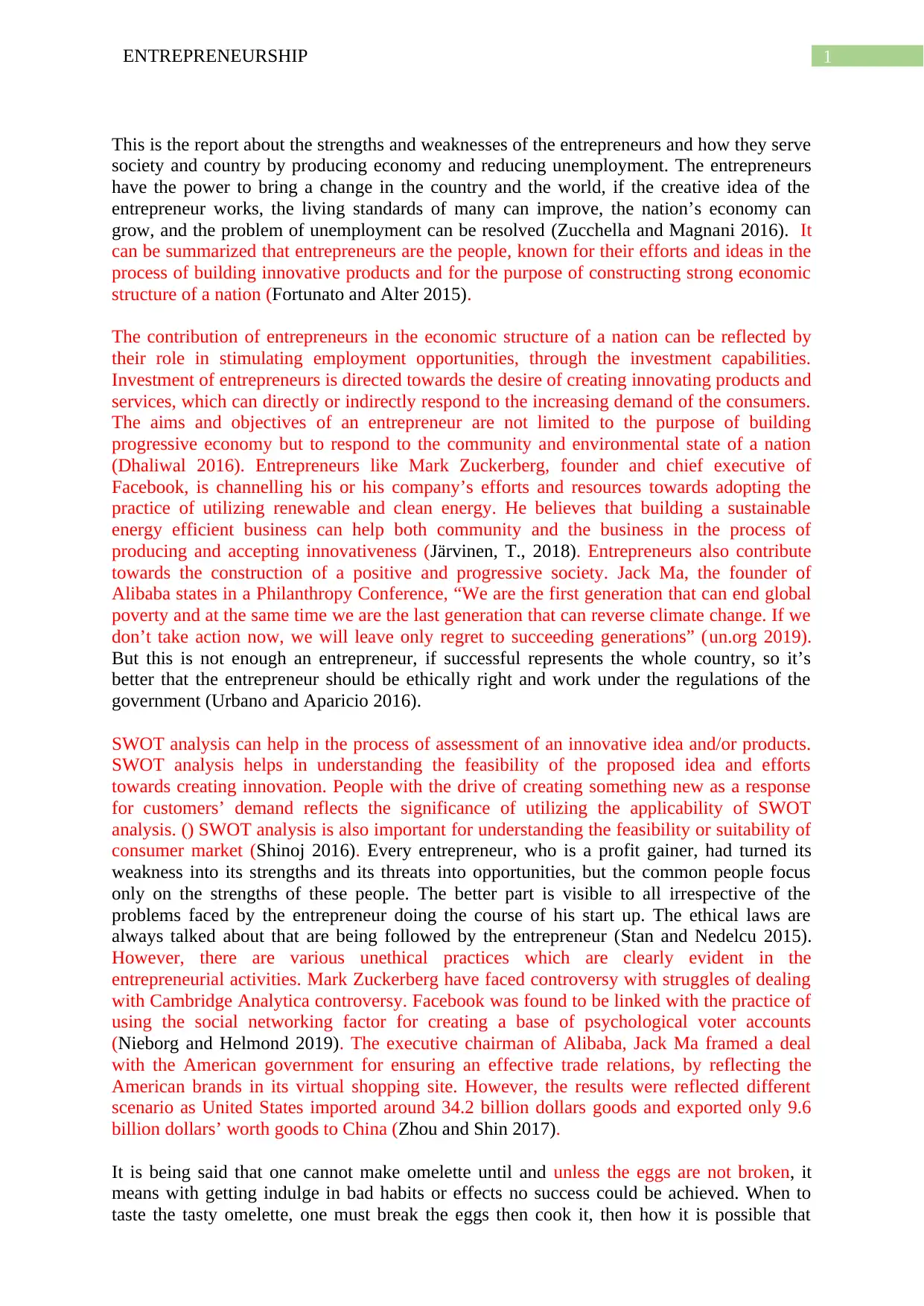
1ENTREPRENEURSHIP
This is the report about the strengths and weaknesses of the entrepreneurs and how they serve
society and country by producing economy and reducing unemployment. The entrepreneurs
have the power to bring a change in the country and the world, if the creative idea of the
entrepreneur works, the living standards of many can improve, the nation’s economy can
grow, and the problem of unemployment can be resolved (Zucchella and Magnani 2016). It
can be summarized that entrepreneurs are the people, known for their efforts and ideas in the
process of building innovative products and for the purpose of constructing strong economic
structure of a nation (Fortunato and Alter 2015).
The contribution of entrepreneurs in the economic structure of a nation can be reflected by
their role in stimulating employment opportunities, through the investment capabilities.
Investment of entrepreneurs is directed towards the desire of creating innovating products and
services, which can directly or indirectly respond to the increasing demand of the consumers.
The aims and objectives of an entrepreneur are not limited to the purpose of building
progressive economy but to respond to the community and environmental state of a nation
(Dhaliwal 2016). Entrepreneurs like Mark Zuckerberg, founder and chief executive of
Facebook, is channelling his or his company’s efforts and resources towards adopting the
practice of utilizing renewable and clean energy. He believes that building a sustainable
energy efficient business can help both community and the business in the process of
producing and accepting innovativeness (Järvinen, T., 2018). Entrepreneurs also contribute
towards the construction of a positive and progressive society. Jack Ma, the founder of
Alibaba states in a Philanthropy Conference, “We are the first generation that can end global
poverty and at the same time we are the last generation that can reverse climate change. If we
don’t take action now, we will leave only regret to succeeding generations” (un.org 2019).
But this is not enough an entrepreneur, if successful represents the whole country, so it’s
better that the entrepreneur should be ethically right and work under the regulations of the
government (Urbano and Aparicio 2016).
SWOT analysis can help in the process of assessment of an innovative idea and/or products.
SWOT analysis helps in understanding the feasibility of the proposed idea and efforts
towards creating innovation. People with the drive of creating something new as a response
for customers’ demand reflects the significance of utilizing the applicability of SWOT
analysis. () SWOT analysis is also important for understanding the feasibility or suitability of
consumer market (Shinoj 2016). Every entrepreneur, who is a profit gainer, had turned its
weakness into its strengths and its threats into opportunities, but the common people focus
only on the strengths of these people. The better part is visible to all irrespective of the
problems faced by the entrepreneur doing the course of his start up. The ethical laws are
always talked about that are being followed by the entrepreneur (Stan and Nedelcu 2015).
However, there are various unethical practices which are clearly evident in the
entrepreneurial activities. Mark Zuckerberg have faced controversy with struggles of dealing
with Cambridge Analytica controversy. Facebook was found to be linked with the practice of
using the social networking factor for creating a base of psychological voter accounts
(Nieborg and Helmond 2019). The executive chairman of Alibaba, Jack Ma framed a deal
with the American government for ensuring an effective trade relations, by reflecting the
American brands in its virtual shopping site. However, the results were reflected different
scenario as United States imported around 34.2 billion dollars goods and exported only 9.6
billion dollars’ worth goods to China (Zhou and Shin 2017).
It is being said that one cannot make omelette until and unless the eggs are not broken, it
means with getting indulge in bad habits or effects no success could be achieved. When to
taste the tasty omelette, one must break the eggs then cook it, then how it is possible that
This is the report about the strengths and weaknesses of the entrepreneurs and how they serve
society and country by producing economy and reducing unemployment. The entrepreneurs
have the power to bring a change in the country and the world, if the creative idea of the
entrepreneur works, the living standards of many can improve, the nation’s economy can
grow, and the problem of unemployment can be resolved (Zucchella and Magnani 2016). It
can be summarized that entrepreneurs are the people, known for their efforts and ideas in the
process of building innovative products and for the purpose of constructing strong economic
structure of a nation (Fortunato and Alter 2015).
The contribution of entrepreneurs in the economic structure of a nation can be reflected by
their role in stimulating employment opportunities, through the investment capabilities.
Investment of entrepreneurs is directed towards the desire of creating innovating products and
services, which can directly or indirectly respond to the increasing demand of the consumers.
The aims and objectives of an entrepreneur are not limited to the purpose of building
progressive economy but to respond to the community and environmental state of a nation
(Dhaliwal 2016). Entrepreneurs like Mark Zuckerberg, founder and chief executive of
Facebook, is channelling his or his company’s efforts and resources towards adopting the
practice of utilizing renewable and clean energy. He believes that building a sustainable
energy efficient business can help both community and the business in the process of
producing and accepting innovativeness (Järvinen, T., 2018). Entrepreneurs also contribute
towards the construction of a positive and progressive society. Jack Ma, the founder of
Alibaba states in a Philanthropy Conference, “We are the first generation that can end global
poverty and at the same time we are the last generation that can reverse climate change. If we
don’t take action now, we will leave only regret to succeeding generations” (un.org 2019).
But this is not enough an entrepreneur, if successful represents the whole country, so it’s
better that the entrepreneur should be ethically right and work under the regulations of the
government (Urbano and Aparicio 2016).
SWOT analysis can help in the process of assessment of an innovative idea and/or products.
SWOT analysis helps in understanding the feasibility of the proposed idea and efforts
towards creating innovation. People with the drive of creating something new as a response
for customers’ demand reflects the significance of utilizing the applicability of SWOT
analysis. () SWOT analysis is also important for understanding the feasibility or suitability of
consumer market (Shinoj 2016). Every entrepreneur, who is a profit gainer, had turned its
weakness into its strengths and its threats into opportunities, but the common people focus
only on the strengths of these people. The better part is visible to all irrespective of the
problems faced by the entrepreneur doing the course of his start up. The ethical laws are
always talked about that are being followed by the entrepreneur (Stan and Nedelcu 2015).
However, there are various unethical practices which are clearly evident in the
entrepreneurial activities. Mark Zuckerberg have faced controversy with struggles of dealing
with Cambridge Analytica controversy. Facebook was found to be linked with the practice of
using the social networking factor for creating a base of psychological voter accounts
(Nieborg and Helmond 2019). The executive chairman of Alibaba, Jack Ma framed a deal
with the American government for ensuring an effective trade relations, by reflecting the
American brands in its virtual shopping site. However, the results were reflected different
scenario as United States imported around 34.2 billion dollars goods and exported only 9.6
billion dollars’ worth goods to China (Zhou and Shin 2017).
It is being said that one cannot make omelette until and unless the eggs are not broken, it
means with getting indulge in bad habits or effects no success could be achieved. When to
taste the tasty omelette, one must break the eggs then cook it, then how it is possible that
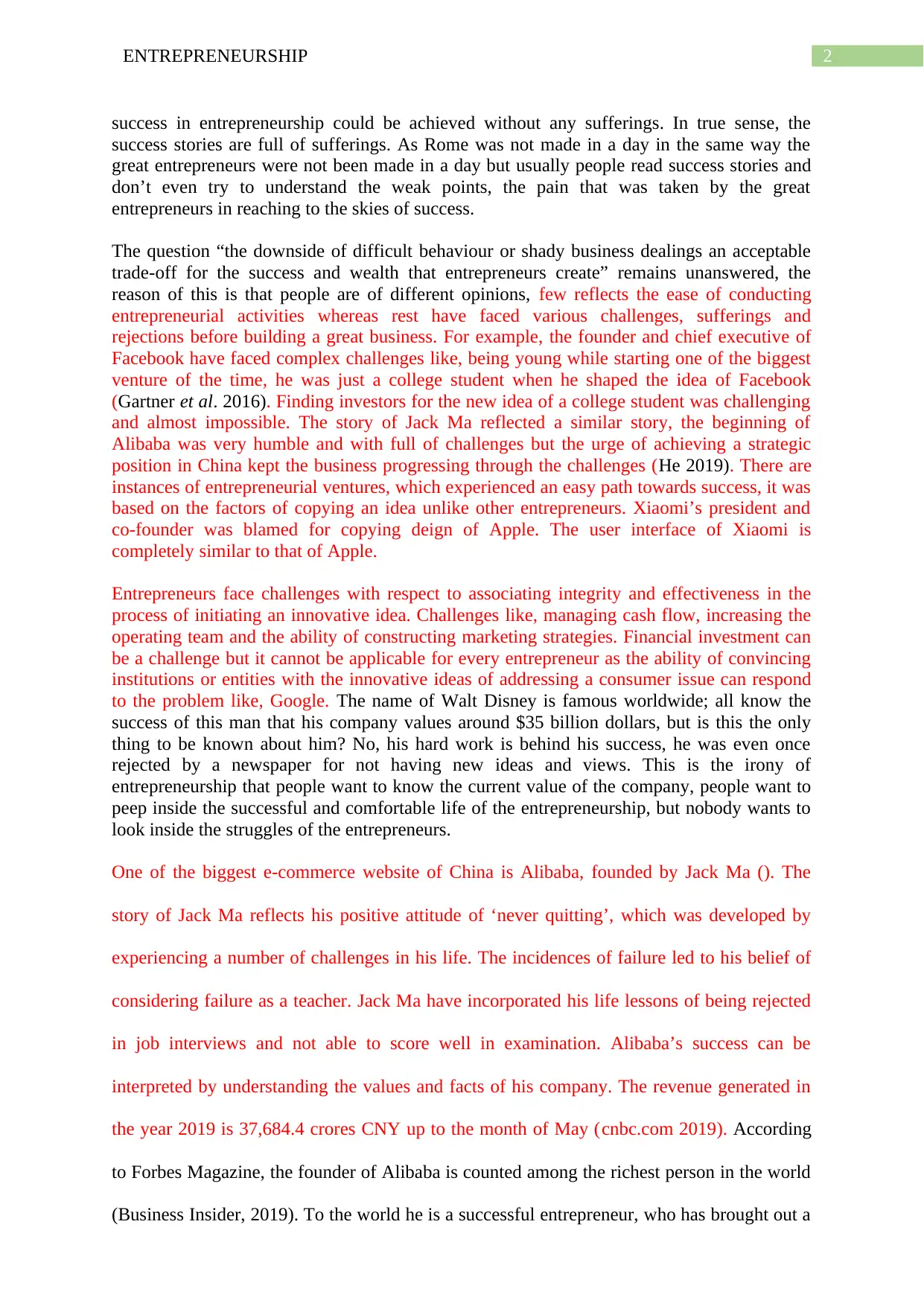
2ENTREPRENEURSHIP
success in entrepreneurship could be achieved without any sufferings. In true sense, the
success stories are full of sufferings. As Rome was not made in a day in the same way the
great entrepreneurs were not been made in a day but usually people read success stories and
don’t even try to understand the weak points, the pain that was taken by the great
entrepreneurs in reaching to the skies of success.
The question “the downside of difficult behaviour or shady business dealings an acceptable
trade-off for the success and wealth that entrepreneurs create” remains unanswered, the
reason of this is that people are of different opinions, few reflects the ease of conducting
entrepreneurial activities whereas rest have faced various challenges, sufferings and
rejections before building a great business. For example, the founder and chief executive of
Facebook have faced complex challenges like, being young while starting one of the biggest
venture of the time, he was just a college student when he shaped the idea of Facebook
(Gartner et al. 2016). Finding investors for the new idea of a college student was challenging
and almost impossible. The story of Jack Ma reflected a similar story, the beginning of
Alibaba was very humble and with full of challenges but the urge of achieving a strategic
position in China kept the business progressing through the challenges (He 2019). There are
instances of entrepreneurial ventures, which experienced an easy path towards success, it was
based on the factors of copying an idea unlike other entrepreneurs. Xiaomi’s president and
co-founder was blamed for copying deign of Apple. The user interface of Xiaomi is
completely similar to that of Apple.
Entrepreneurs face challenges with respect to associating integrity and effectiveness in the
process of initiating an innovative idea. Challenges like, managing cash flow, increasing the
operating team and the ability of constructing marketing strategies. Financial investment can
be a challenge but it cannot be applicable for every entrepreneur as the ability of convincing
institutions or entities with the innovative ideas of addressing a consumer issue can respond
to the problem like, Google. The name of Walt Disney is famous worldwide; all know the
success of this man that his company values around $35 billion dollars, but is this the only
thing to be known about him? No, his hard work is behind his success, he was even once
rejected by a newspaper for not having new ideas and views. This is the irony of
entrepreneurship that people want to know the current value of the company, people want to
peep inside the successful and comfortable life of the entrepreneurship, but nobody wants to
look inside the struggles of the entrepreneurs.
One of the biggest e-commerce website of China is Alibaba, founded by Jack Ma (). The
story of Jack Ma reflects his positive attitude of ‘never quitting’, which was developed by
experiencing a number of challenges in his life. The incidences of failure led to his belief of
considering failure as a teacher. Jack Ma have incorporated his life lessons of being rejected
in job interviews and not able to score well in examination. Alibaba’s success can be
interpreted by understanding the values and facts of his company. The revenue generated in
the year 2019 is 37,684.4 crores CNY up to the month of May (cnbc.com 2019). According
to Forbes Magazine, the founder of Alibaba is counted among the richest person in the world
(Business Insider, 2019). To the world he is a successful entrepreneur, who has brought out a
success in entrepreneurship could be achieved without any sufferings. In true sense, the
success stories are full of sufferings. As Rome was not made in a day in the same way the
great entrepreneurs were not been made in a day but usually people read success stories and
don’t even try to understand the weak points, the pain that was taken by the great
entrepreneurs in reaching to the skies of success.
The question “the downside of difficult behaviour or shady business dealings an acceptable
trade-off for the success and wealth that entrepreneurs create” remains unanswered, the
reason of this is that people are of different opinions, few reflects the ease of conducting
entrepreneurial activities whereas rest have faced various challenges, sufferings and
rejections before building a great business. For example, the founder and chief executive of
Facebook have faced complex challenges like, being young while starting one of the biggest
venture of the time, he was just a college student when he shaped the idea of Facebook
(Gartner et al. 2016). Finding investors for the new idea of a college student was challenging
and almost impossible. The story of Jack Ma reflected a similar story, the beginning of
Alibaba was very humble and with full of challenges but the urge of achieving a strategic
position in China kept the business progressing through the challenges (He 2019). There are
instances of entrepreneurial ventures, which experienced an easy path towards success, it was
based on the factors of copying an idea unlike other entrepreneurs. Xiaomi’s president and
co-founder was blamed for copying deign of Apple. The user interface of Xiaomi is
completely similar to that of Apple.
Entrepreneurs face challenges with respect to associating integrity and effectiveness in the
process of initiating an innovative idea. Challenges like, managing cash flow, increasing the
operating team and the ability of constructing marketing strategies. Financial investment can
be a challenge but it cannot be applicable for every entrepreneur as the ability of convincing
institutions or entities with the innovative ideas of addressing a consumer issue can respond
to the problem like, Google. The name of Walt Disney is famous worldwide; all know the
success of this man that his company values around $35 billion dollars, but is this the only
thing to be known about him? No, his hard work is behind his success, he was even once
rejected by a newspaper for not having new ideas and views. This is the irony of
entrepreneurship that people want to know the current value of the company, people want to
peep inside the successful and comfortable life of the entrepreneurship, but nobody wants to
look inside the struggles of the entrepreneurs.
One of the biggest e-commerce website of China is Alibaba, founded by Jack Ma (). The
story of Jack Ma reflects his positive attitude of ‘never quitting’, which was developed by
experiencing a number of challenges in his life. The incidences of failure led to his belief of
considering failure as a teacher. Jack Ma have incorporated his life lessons of being rejected
in job interviews and not able to score well in examination. Alibaba’s success can be
interpreted by understanding the values and facts of his company. The revenue generated in
the year 2019 is 37,684.4 crores CNY up to the month of May (cnbc.com 2019). According
to Forbes Magazine, the founder of Alibaba is counted among the richest person in the world
(Business Insider, 2019). To the world he is a successful entrepreneur, who has brought out a
⊘ This is a preview!⊘
Do you want full access?
Subscribe today to unlock all pages.

Trusted by 1+ million students worldwide
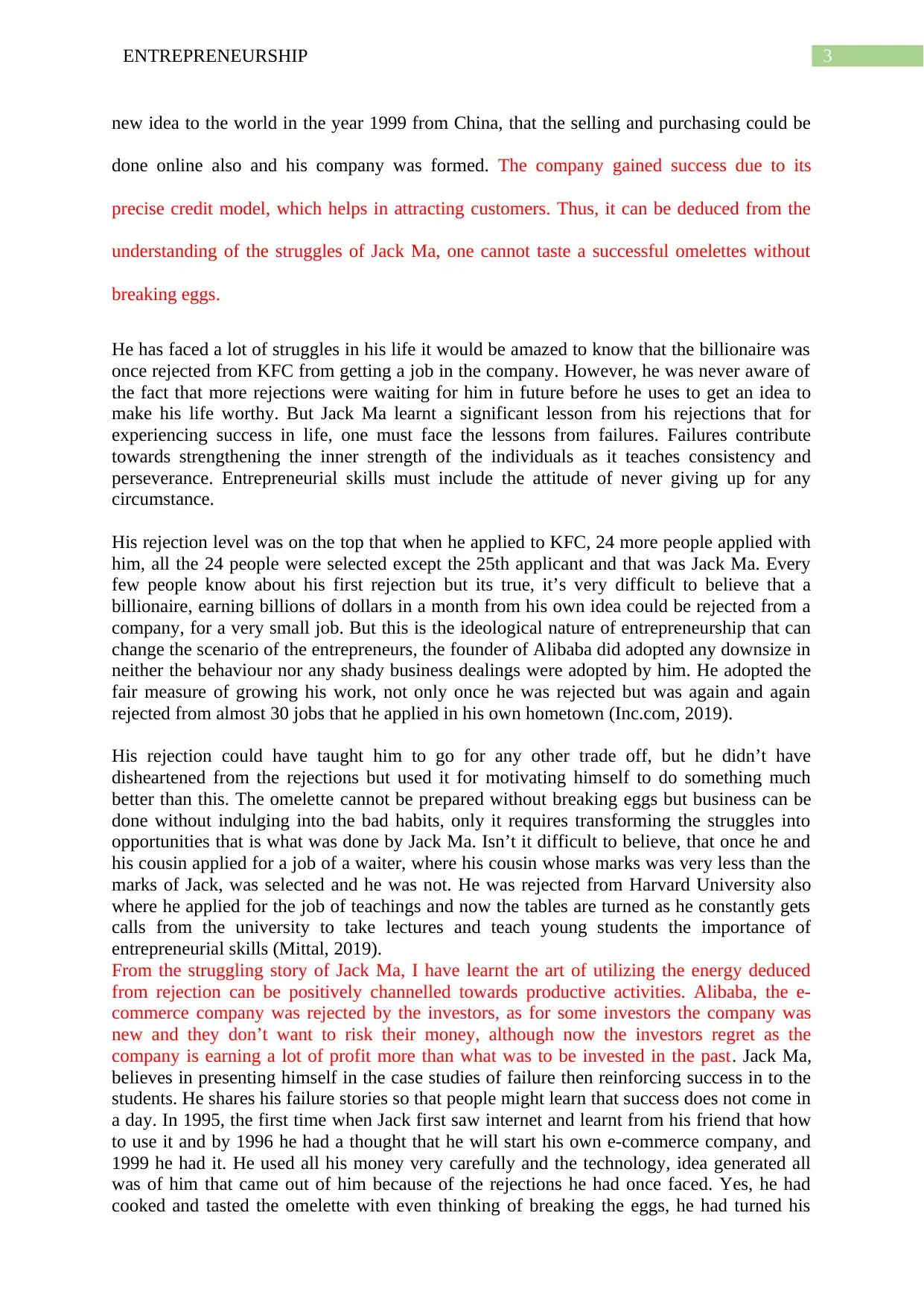
3ENTREPRENEURSHIP
new idea to the world in the year 1999 from China, that the selling and purchasing could be
done online also and his company was formed. The company gained success due to its
precise credit model, which helps in attracting customers. Thus, it can be deduced from the
understanding of the struggles of Jack Ma, one cannot taste a successful omelettes without
breaking eggs.
He has faced a lot of struggles in his life it would be amazed to know that the billionaire was
once rejected from KFC from getting a job in the company. However, he was never aware of
the fact that more rejections were waiting for him in future before he uses to get an idea to
make his life worthy. But Jack Ma learnt a significant lesson from his rejections that for
experiencing success in life, one must face the lessons from failures. Failures contribute
towards strengthening the inner strength of the individuals as it teaches consistency and
perseverance. Entrepreneurial skills must include the attitude of never giving up for any
circumstance.
His rejection level was on the top that when he applied to KFC, 24 more people applied with
him, all the 24 people were selected except the 25th applicant and that was Jack Ma. Every
few people know about his first rejection but its true, it’s very difficult to believe that a
billionaire, earning billions of dollars in a month from his own idea could be rejected from a
company, for a very small job. But this is the ideological nature of entrepreneurship that can
change the scenario of the entrepreneurs, the founder of Alibaba did adopted any downsize in
neither the behaviour nor any shady business dealings were adopted by him. He adopted the
fair measure of growing his work, not only once he was rejected but was again and again
rejected from almost 30 jobs that he applied in his own hometown (Inc.com, 2019).
His rejection could have taught him to go for any other trade off, but he didn’t have
disheartened from the rejections but used it for motivating himself to do something much
better than this. The omelette cannot be prepared without breaking eggs but business can be
done without indulging into the bad habits, only it requires transforming the struggles into
opportunities that is what was done by Jack Ma. Isn’t it difficult to believe, that once he and
his cousin applied for a job of a waiter, where his cousin whose marks was very less than the
marks of Jack, was selected and he was not. He was rejected from Harvard University also
where he applied for the job of teachings and now the tables are turned as he constantly gets
calls from the university to take lectures and teach young students the importance of
entrepreneurial skills (Mittal, 2019).
From the struggling story of Jack Ma, I have learnt the art of utilizing the energy deduced
from rejection can be positively channelled towards productive activities. Alibaba, the e-
commerce company was rejected by the investors, as for some investors the company was
new and they don’t want to risk their money, although now the investors regret as the
company is earning a lot of profit more than what was to be invested in the past. Jack Ma,
believes in presenting himself in the case studies of failure then reinforcing success in to the
students. He shares his failure stories so that people might learn that success does not come in
a day. In 1995, the first time when Jack first saw internet and learnt from his friend that how
to use it and by 1996 he had a thought that he will start his own e-commerce company, and
1999 he had it. He used all his money very carefully and the technology, idea generated all
was of him that came out of him because of the rejections he had once faced. Yes, he had
cooked and tasted the omelette with even thinking of breaking the eggs, he had turned his
new idea to the world in the year 1999 from China, that the selling and purchasing could be
done online also and his company was formed. The company gained success due to its
precise credit model, which helps in attracting customers. Thus, it can be deduced from the
understanding of the struggles of Jack Ma, one cannot taste a successful omelettes without
breaking eggs.
He has faced a lot of struggles in his life it would be amazed to know that the billionaire was
once rejected from KFC from getting a job in the company. However, he was never aware of
the fact that more rejections were waiting for him in future before he uses to get an idea to
make his life worthy. But Jack Ma learnt a significant lesson from his rejections that for
experiencing success in life, one must face the lessons from failures. Failures contribute
towards strengthening the inner strength of the individuals as it teaches consistency and
perseverance. Entrepreneurial skills must include the attitude of never giving up for any
circumstance.
His rejection level was on the top that when he applied to KFC, 24 more people applied with
him, all the 24 people were selected except the 25th applicant and that was Jack Ma. Every
few people know about his first rejection but its true, it’s very difficult to believe that a
billionaire, earning billions of dollars in a month from his own idea could be rejected from a
company, for a very small job. But this is the ideological nature of entrepreneurship that can
change the scenario of the entrepreneurs, the founder of Alibaba did adopted any downsize in
neither the behaviour nor any shady business dealings were adopted by him. He adopted the
fair measure of growing his work, not only once he was rejected but was again and again
rejected from almost 30 jobs that he applied in his own hometown (Inc.com, 2019).
His rejection could have taught him to go for any other trade off, but he didn’t have
disheartened from the rejections but used it for motivating himself to do something much
better than this. The omelette cannot be prepared without breaking eggs but business can be
done without indulging into the bad habits, only it requires transforming the struggles into
opportunities that is what was done by Jack Ma. Isn’t it difficult to believe, that once he and
his cousin applied for a job of a waiter, where his cousin whose marks was very less than the
marks of Jack, was selected and he was not. He was rejected from Harvard University also
where he applied for the job of teachings and now the tables are turned as he constantly gets
calls from the university to take lectures and teach young students the importance of
entrepreneurial skills (Mittal, 2019).
From the struggling story of Jack Ma, I have learnt the art of utilizing the energy deduced
from rejection can be positively channelled towards productive activities. Alibaba, the e-
commerce company was rejected by the investors, as for some investors the company was
new and they don’t want to risk their money, although now the investors regret as the
company is earning a lot of profit more than what was to be invested in the past. Jack Ma,
believes in presenting himself in the case studies of failure then reinforcing success in to the
students. He shares his failure stories so that people might learn that success does not come in
a day. In 1995, the first time when Jack first saw internet and learnt from his friend that how
to use it and by 1996 he had a thought that he will start his own e-commerce company, and
1999 he had it. He used all his money very carefully and the technology, idea generated all
was of him that came out of him because of the rejections he had once faced. Yes, he had
cooked and tasted the omelette with even thinking of breaking the eggs, he had turned his
Paraphrase This Document
Need a fresh take? Get an instant paraphrase of this document with our AI Paraphraser
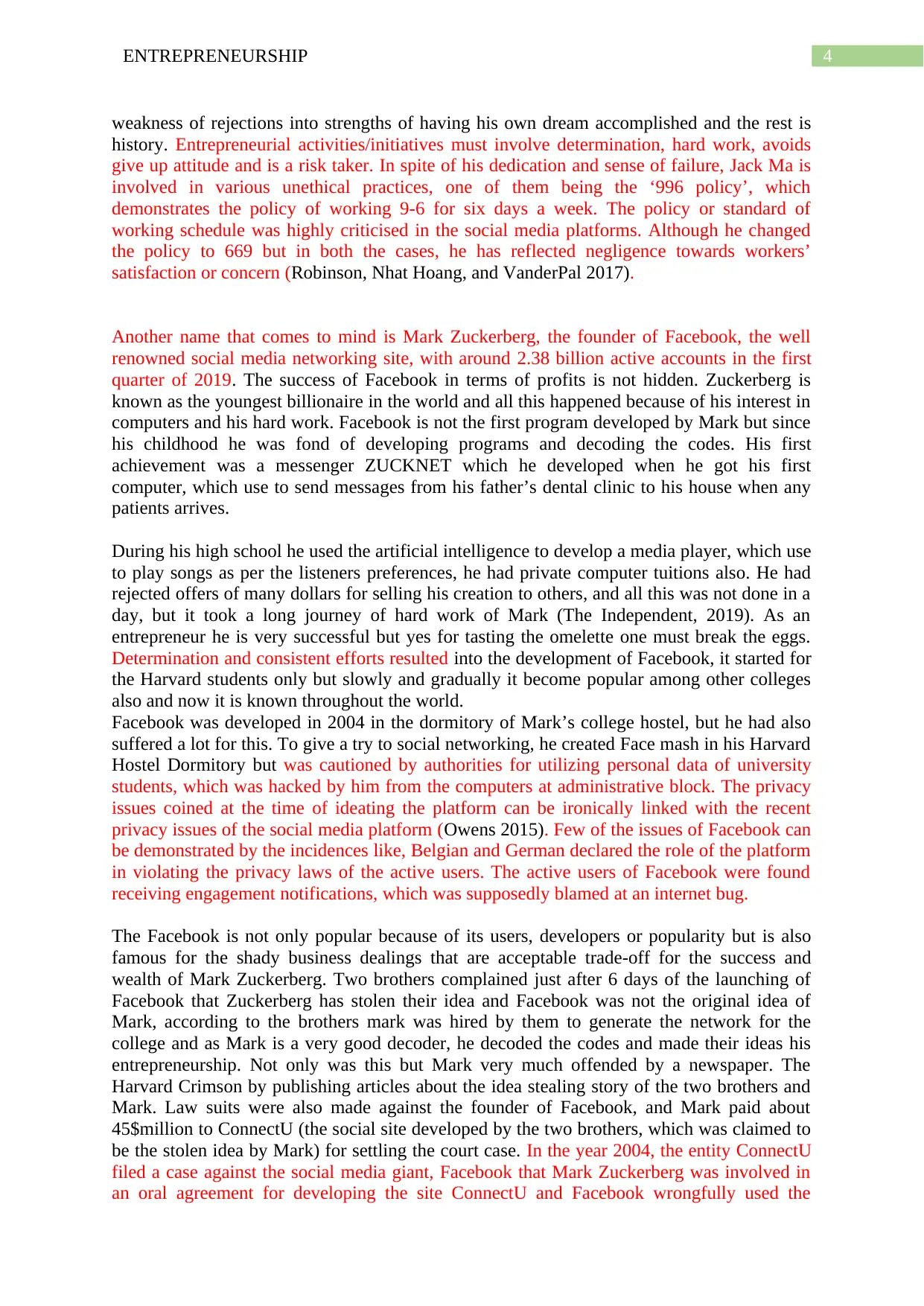
4ENTREPRENEURSHIP
weakness of rejections into strengths of having his own dream accomplished and the rest is
history. Entrepreneurial activities/initiatives must involve determination, hard work, avoids
give up attitude and is a risk taker. In spite of his dedication and sense of failure, Jack Ma is
involved in various unethical practices, one of them being the ‘996 policy’, which
demonstrates the policy of working 9-6 for six days a week. The policy or standard of
working schedule was highly criticised in the social media platforms. Although he changed
the policy to 669 but in both the cases, he has reflected negligence towards workers’
satisfaction or concern (Robinson, Nhat Hoang, and VanderPal 2017).
Another name that comes to mind is Mark Zuckerberg, the founder of Facebook, the well
renowned social media networking site, with around 2.38 billion active accounts in the first
quarter of 2019. The success of Facebook in terms of profits is not hidden. Zuckerberg is
known as the youngest billionaire in the world and all this happened because of his interest in
computers and his hard work. Facebook is not the first program developed by Mark but since
his childhood he was fond of developing programs and decoding the codes. His first
achievement was a messenger ZUCKNET which he developed when he got his first
computer, which use to send messages from his father’s dental clinic to his house when any
patients arrives.
During his high school he used the artificial intelligence to develop a media player, which use
to play songs as per the listeners preferences, he had private computer tuitions also. He had
rejected offers of many dollars for selling his creation to others, and all this was not done in a
day, but it took a long journey of hard work of Mark (The Independent, 2019). As an
entrepreneur he is very successful but yes for tasting the omelette one must break the eggs.
Determination and consistent efforts resulted into the development of Facebook, it started for
the Harvard students only but slowly and gradually it become popular among other colleges
also and now it is known throughout the world.
Facebook was developed in 2004 in the dormitory of Mark’s college hostel, but he had also
suffered a lot for this. To give a try to social networking, he created Face mash in his Harvard
Hostel Dormitory but was cautioned by authorities for utilizing personal data of university
students, which was hacked by him from the computers at administrative block. The privacy
issues coined at the time of ideating the platform can be ironically linked with the recent
privacy issues of the social media platform (Owens 2015). Few of the issues of Facebook can
be demonstrated by the incidences like, Belgian and German declared the role of the platform
in violating the privacy laws of the active users. The active users of Facebook were found
receiving engagement notifications, which was supposedly blamed at an internet bug.
The Facebook is not only popular because of its users, developers or popularity but is also
famous for the shady business dealings that are acceptable trade-off for the success and
wealth of Mark Zuckerberg. Two brothers complained just after 6 days of the launching of
Facebook that Zuckerberg has stolen their idea and Facebook was not the original idea of
Mark, according to the brothers mark was hired by them to generate the network for the
college and as Mark is a very good decoder, he decoded the codes and made their ideas his
entrepreneurship. Not only was this but Mark very much offended by a newspaper. The
Harvard Crimson by publishing articles about the idea stealing story of the two brothers and
Mark. Law suits were also made against the founder of Facebook, and Mark paid about
45$million to ConnectU (the social site developed by the two brothers, which was claimed to
be the stolen idea by Mark) for settling the court case. In the year 2004, the entity ConnectU
filed a case against the social media giant, Facebook that Mark Zuckerberg was involved in
an oral agreement for developing the site ConnectU and Facebook wrongfully used the
weakness of rejections into strengths of having his own dream accomplished and the rest is
history. Entrepreneurial activities/initiatives must involve determination, hard work, avoids
give up attitude and is a risk taker. In spite of his dedication and sense of failure, Jack Ma is
involved in various unethical practices, one of them being the ‘996 policy’, which
demonstrates the policy of working 9-6 for six days a week. The policy or standard of
working schedule was highly criticised in the social media platforms. Although he changed
the policy to 669 but in both the cases, he has reflected negligence towards workers’
satisfaction or concern (Robinson, Nhat Hoang, and VanderPal 2017).
Another name that comes to mind is Mark Zuckerberg, the founder of Facebook, the well
renowned social media networking site, with around 2.38 billion active accounts in the first
quarter of 2019. The success of Facebook in terms of profits is not hidden. Zuckerberg is
known as the youngest billionaire in the world and all this happened because of his interest in
computers and his hard work. Facebook is not the first program developed by Mark but since
his childhood he was fond of developing programs and decoding the codes. His first
achievement was a messenger ZUCKNET which he developed when he got his first
computer, which use to send messages from his father’s dental clinic to his house when any
patients arrives.
During his high school he used the artificial intelligence to develop a media player, which use
to play songs as per the listeners preferences, he had private computer tuitions also. He had
rejected offers of many dollars for selling his creation to others, and all this was not done in a
day, but it took a long journey of hard work of Mark (The Independent, 2019). As an
entrepreneur he is very successful but yes for tasting the omelette one must break the eggs.
Determination and consistent efforts resulted into the development of Facebook, it started for
the Harvard students only but slowly and gradually it become popular among other colleges
also and now it is known throughout the world.
Facebook was developed in 2004 in the dormitory of Mark’s college hostel, but he had also
suffered a lot for this. To give a try to social networking, he created Face mash in his Harvard
Hostel Dormitory but was cautioned by authorities for utilizing personal data of university
students, which was hacked by him from the computers at administrative block. The privacy
issues coined at the time of ideating the platform can be ironically linked with the recent
privacy issues of the social media platform (Owens 2015). Few of the issues of Facebook can
be demonstrated by the incidences like, Belgian and German declared the role of the platform
in violating the privacy laws of the active users. The active users of Facebook were found
receiving engagement notifications, which was supposedly blamed at an internet bug.
The Facebook is not only popular because of its users, developers or popularity but is also
famous for the shady business dealings that are acceptable trade-off for the success and
wealth of Mark Zuckerberg. Two brothers complained just after 6 days of the launching of
Facebook that Zuckerberg has stolen their idea and Facebook was not the original idea of
Mark, according to the brothers mark was hired by them to generate the network for the
college and as Mark is a very good decoder, he decoded the codes and made their ideas his
entrepreneurship. Not only was this but Mark very much offended by a newspaper. The
Harvard Crimson by publishing articles about the idea stealing story of the two brothers and
Mark. Law suits were also made against the founder of Facebook, and Mark paid about
45$million to ConnectU (the social site developed by the two brothers, which was claimed to
be the stolen idea by Mark) for settling the court case. In the year 2004, the entity ConnectU
filed a case against the social media giant, Facebook that Mark Zuckerberg was involved in
an oral agreement for developing the site ConnectU and Facebook wrongfully used the
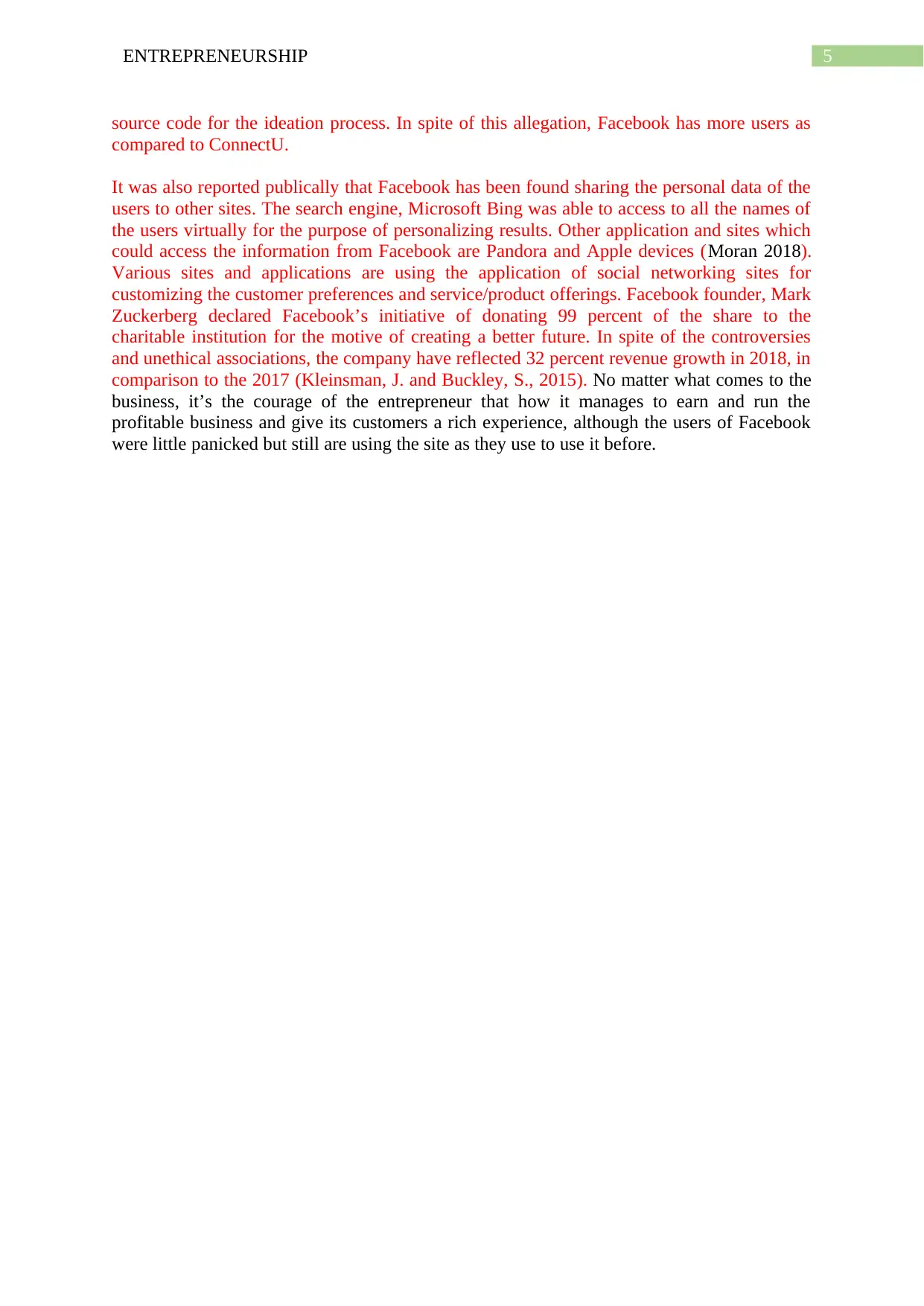
5ENTREPRENEURSHIP
source code for the ideation process. In spite of this allegation, Facebook has more users as
compared to ConnectU.
It was also reported publically that Facebook has been found sharing the personal data of the
users to other sites. The search engine, Microsoft Bing was able to access to all the names of
the users virtually for the purpose of personalizing results. Other application and sites which
could access the information from Facebook are Pandora and Apple devices (Moran 2018).
Various sites and applications are using the application of social networking sites for
customizing the customer preferences and service/product offerings. Facebook founder, Mark
Zuckerberg declared Facebook’s initiative of donating 99 percent of the share to the
charitable institution for the motive of creating a better future. In spite of the controversies
and unethical associations, the company have reflected 32 percent revenue growth in 2018, in
comparison to the 2017 (Kleinsman, J. and Buckley, S., 2015). No matter what comes to the
business, it’s the courage of the entrepreneur that how it manages to earn and run the
profitable business and give its customers a rich experience, although the users of Facebook
were little panicked but still are using the site as they use to use it before.
source code for the ideation process. In spite of this allegation, Facebook has more users as
compared to ConnectU.
It was also reported publically that Facebook has been found sharing the personal data of the
users to other sites. The search engine, Microsoft Bing was able to access to all the names of
the users virtually for the purpose of personalizing results. Other application and sites which
could access the information from Facebook are Pandora and Apple devices (Moran 2018).
Various sites and applications are using the application of social networking sites for
customizing the customer preferences and service/product offerings. Facebook founder, Mark
Zuckerberg declared Facebook’s initiative of donating 99 percent of the share to the
charitable institution for the motive of creating a better future. In spite of the controversies
and unethical associations, the company have reflected 32 percent revenue growth in 2018, in
comparison to the 2017 (Kleinsman, J. and Buckley, S., 2015). No matter what comes to the
business, it’s the courage of the entrepreneur that how it manages to earn and run the
profitable business and give its customers a rich experience, although the users of Facebook
were little panicked but still are using the site as they use to use it before.
⊘ This is a preview!⊘
Do you want full access?
Subscribe today to unlock all pages.

Trusted by 1+ million students worldwide
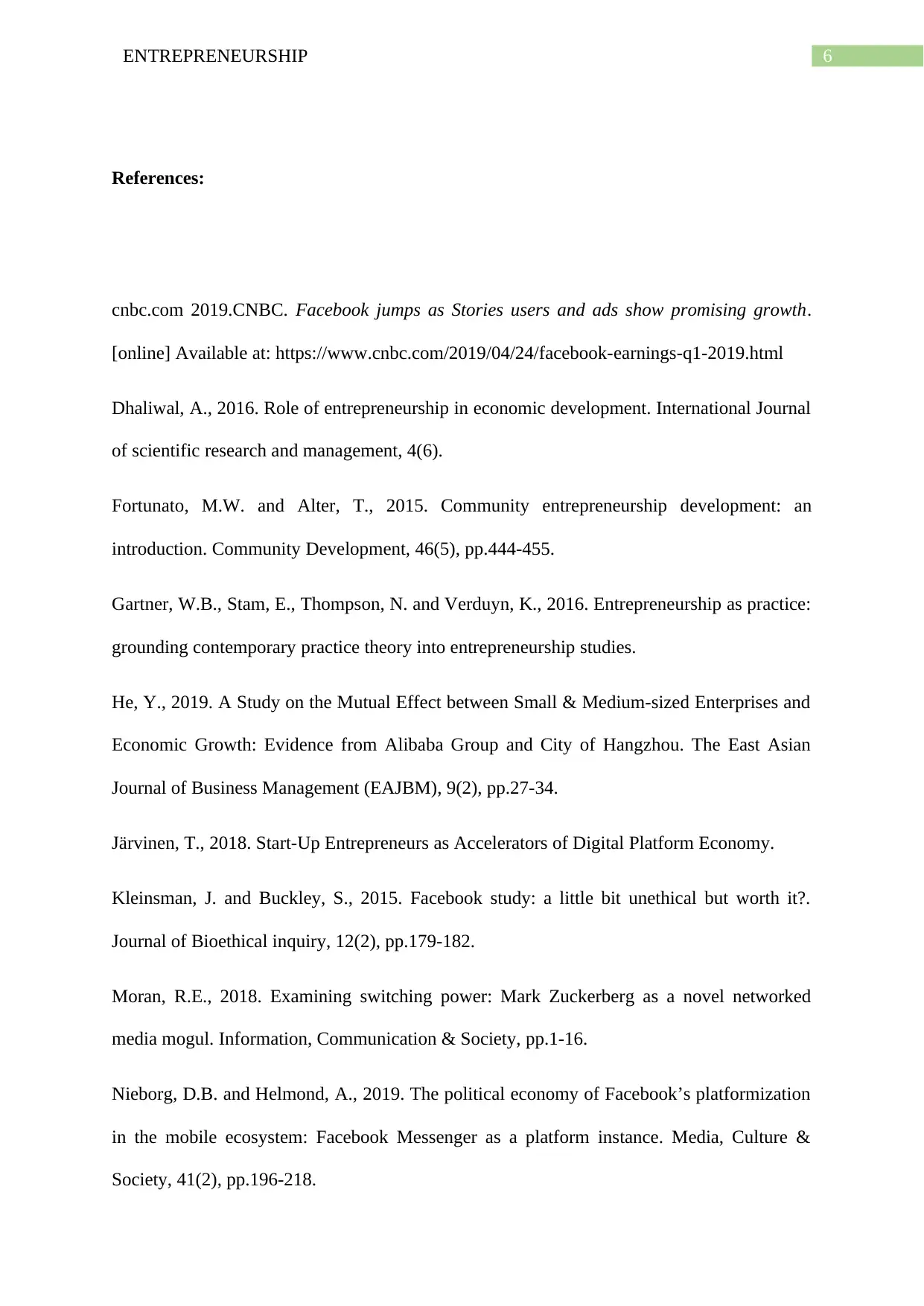
6ENTREPRENEURSHIP
References:
cnbc.com 2019.CNBC. Facebook jumps as Stories users and ads show promising growth.
[online] Available at: https://www.cnbc.com/2019/04/24/facebook-earnings-q1-2019.html
Dhaliwal, A., 2016. Role of entrepreneurship in economic development. International Journal
of scientific research and management, 4(6).
Fortunato, M.W. and Alter, T., 2015. Community entrepreneurship development: an
introduction. Community Development, 46(5), pp.444-455.
Gartner, W.B., Stam, E., Thompson, N. and Verduyn, K., 2016. Entrepreneurship as practice:
grounding contemporary practice theory into entrepreneurship studies.
He, Y., 2019. A Study on the Mutual Effect between Small & Medium-sized Enterprises and
Economic Growth: Evidence from Alibaba Group and City of Hangzhou. The East Asian
Journal of Business Management (EAJBM), 9(2), pp.27-34.
Järvinen, T., 2018. Start-Up Entrepreneurs as Accelerators of Digital Platform Economy.
Kleinsman, J. and Buckley, S., 2015. Facebook study: a little bit unethical but worth it?.
Journal of Bioethical inquiry, 12(2), pp.179-182.
Moran, R.E., 2018. Examining switching power: Mark Zuckerberg as a novel networked
media mogul. Information, Communication & Society, pp.1-16.
Nieborg, D.B. and Helmond, A., 2019. The political economy of Facebook’s platformization
in the mobile ecosystem: Facebook Messenger as a platform instance. Media, Culture &
Society, 41(2), pp.196-218.
References:
cnbc.com 2019.CNBC. Facebook jumps as Stories users and ads show promising growth.
[online] Available at: https://www.cnbc.com/2019/04/24/facebook-earnings-q1-2019.html
Dhaliwal, A., 2016. Role of entrepreneurship in economic development. International Journal
of scientific research and management, 4(6).
Fortunato, M.W. and Alter, T., 2015. Community entrepreneurship development: an
introduction. Community Development, 46(5), pp.444-455.
Gartner, W.B., Stam, E., Thompson, N. and Verduyn, K., 2016. Entrepreneurship as practice:
grounding contemporary practice theory into entrepreneurship studies.
He, Y., 2019. A Study on the Mutual Effect between Small & Medium-sized Enterprises and
Economic Growth: Evidence from Alibaba Group and City of Hangzhou. The East Asian
Journal of Business Management (EAJBM), 9(2), pp.27-34.
Järvinen, T., 2018. Start-Up Entrepreneurs as Accelerators of Digital Platform Economy.
Kleinsman, J. and Buckley, S., 2015. Facebook study: a little bit unethical but worth it?.
Journal of Bioethical inquiry, 12(2), pp.179-182.
Moran, R.E., 2018. Examining switching power: Mark Zuckerberg as a novel networked
media mogul. Information, Communication & Society, pp.1-16.
Nieborg, D.B. and Helmond, A., 2019. The political economy of Facebook’s platformization
in the mobile ecosystem: Facebook Messenger as a platform instance. Media, Culture &
Society, 41(2), pp.196-218.
Paraphrase This Document
Need a fresh take? Get an instant paraphrase of this document with our AI Paraphraser
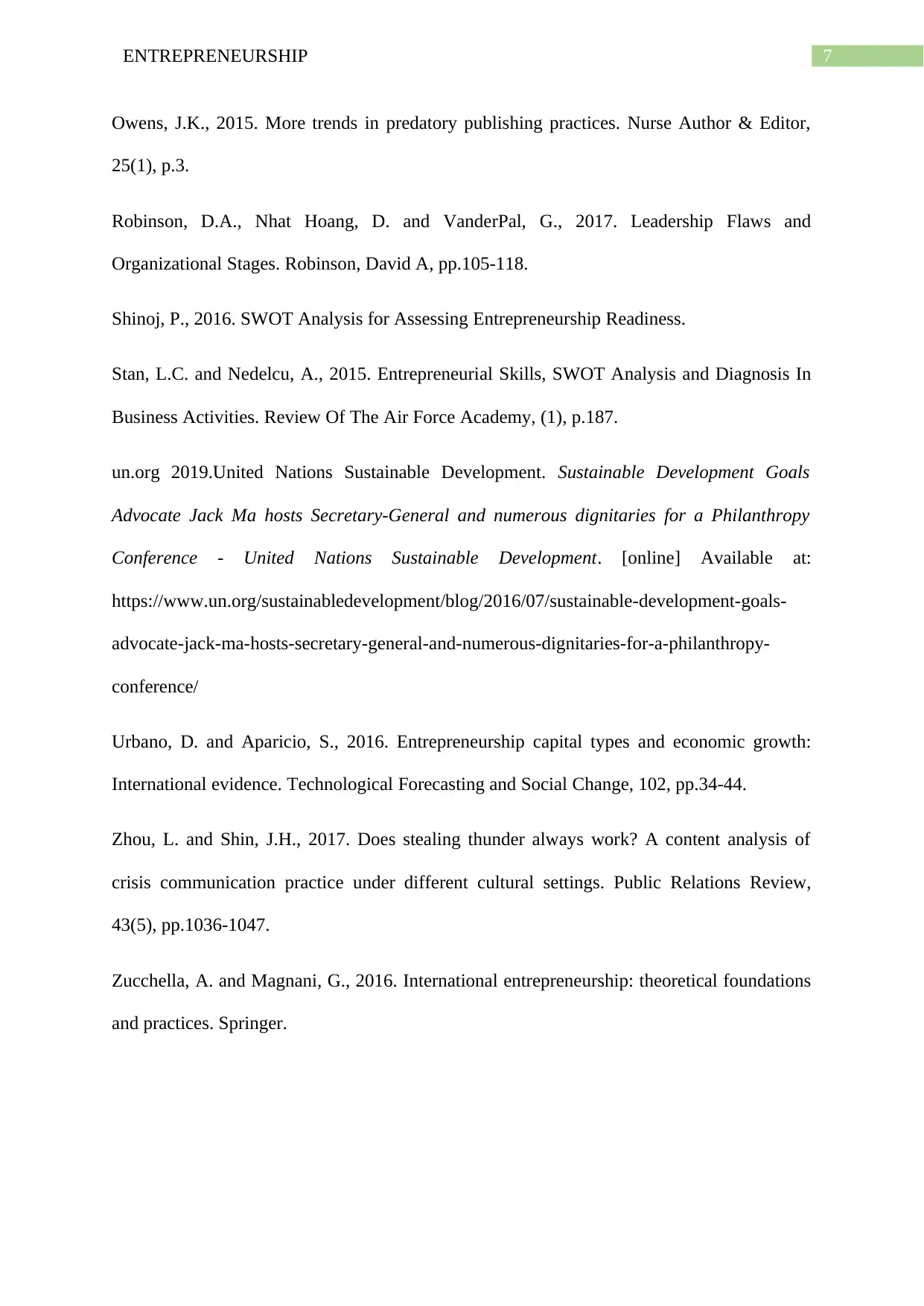
7ENTREPRENEURSHIP
Owens, J.K., 2015. More trends in predatory publishing practices. Nurse Author & Editor,
25(1), p.3.
Robinson, D.A., Nhat Hoang, D. and VanderPal, G., 2017. Leadership Flaws and
Organizational Stages. Robinson, David A, pp.105-118.
Shinoj, P., 2016. SWOT Analysis for Assessing Entrepreneurship Readiness.
Stan, L.C. and Nedelcu, A., 2015. Entrepreneurial Skills, SWOT Analysis and Diagnosis In
Business Activities. Review Of The Air Force Academy, (1), p.187.
un.org 2019.United Nations Sustainable Development. Sustainable Development Goals
Advocate Jack Ma hosts Secretary-General and numerous dignitaries for a Philanthropy
Conference - United Nations Sustainable Development. [online] Available at:
https://www.un.org/sustainabledevelopment/blog/2016/07/sustainable-development-goals-
advocate-jack-ma-hosts-secretary-general-and-numerous-dignitaries-for-a-philanthropy-
conference/
Urbano, D. and Aparicio, S., 2016. Entrepreneurship capital types and economic growth:
International evidence. Technological Forecasting and Social Change, 102, pp.34-44.
Zhou, L. and Shin, J.H., 2017. Does stealing thunder always work? A content analysis of
crisis communication practice under different cultural settings. Public Relations Review,
43(5), pp.1036-1047.
Zucchella, A. and Magnani, G., 2016. International entrepreneurship: theoretical foundations
and practices. Springer.
Owens, J.K., 2015. More trends in predatory publishing practices. Nurse Author & Editor,
25(1), p.3.
Robinson, D.A., Nhat Hoang, D. and VanderPal, G., 2017. Leadership Flaws and
Organizational Stages. Robinson, David A, pp.105-118.
Shinoj, P., 2016. SWOT Analysis for Assessing Entrepreneurship Readiness.
Stan, L.C. and Nedelcu, A., 2015. Entrepreneurial Skills, SWOT Analysis and Diagnosis In
Business Activities. Review Of The Air Force Academy, (1), p.187.
un.org 2019.United Nations Sustainable Development. Sustainable Development Goals
Advocate Jack Ma hosts Secretary-General and numerous dignitaries for a Philanthropy
Conference - United Nations Sustainable Development. [online] Available at:
https://www.un.org/sustainabledevelopment/blog/2016/07/sustainable-development-goals-
advocate-jack-ma-hosts-secretary-general-and-numerous-dignitaries-for-a-philanthropy-
conference/
Urbano, D. and Aparicio, S., 2016. Entrepreneurship capital types and economic growth:
International evidence. Technological Forecasting and Social Change, 102, pp.34-44.
Zhou, L. and Shin, J.H., 2017. Does stealing thunder always work? A content analysis of
crisis communication practice under different cultural settings. Public Relations Review,
43(5), pp.1036-1047.
Zucchella, A. and Magnani, G., 2016. International entrepreneurship: theoretical foundations
and practices. Springer.
1 out of 8
Related Documents
Your All-in-One AI-Powered Toolkit for Academic Success.
+13062052269
info@desklib.com
Available 24*7 on WhatsApp / Email
![[object Object]](/_next/static/media/star-bottom.7253800d.svg)
Unlock your academic potential
Copyright © 2020–2026 A2Z Services. All Rights Reserved. Developed and managed by ZUCOL.





